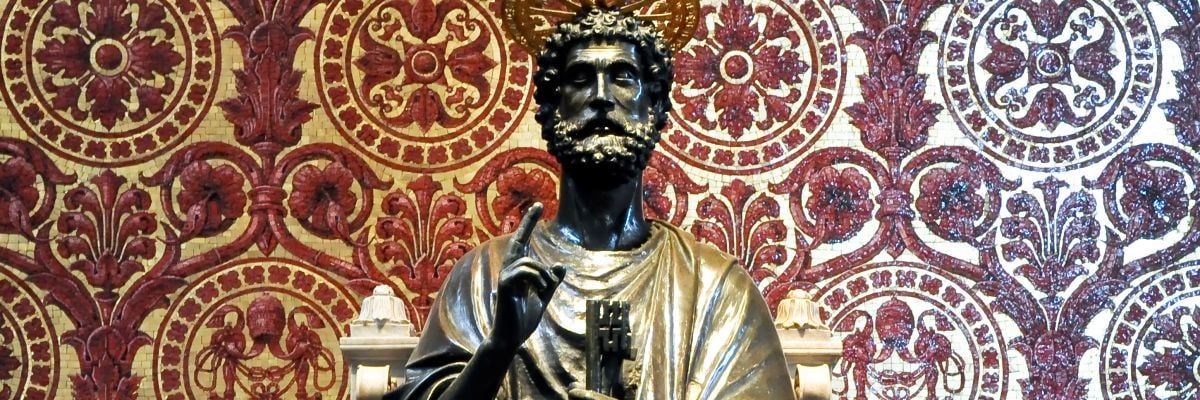
In Greek mythology, one of Hercules’ struggles is to slay the sea serpent Hydra, a monster with several heads. But as soon as Hercules cut off one head, two more grew back in its place. The problem seemed insurmountable. Perhaps you’ve experienced something similar in Catholic-Protestant dialogue: as soon as you try to answer questions on one doctrine, it seems that two or more new questions emerge instead. Sometimes, this is because the other person isn’t approaching the topic in good faith: they’re trying to score rhetorical points, rather than seeking the truth. But sometimes, it’s simply because we don’t know where to start. There are so many differences between Catholics and Protestants, and many of those differences are interconnected, that it can be hard to have a good conversation.
For instance, a well-meaning Protestant might ask, “Why do you Catholics worship Mary?” You begin to explain that we don’t worship Mary; rather, we honor her, and pray to her, seeking her powerful intercessory prayers before God. But where there had been one question, now there are several: why do Catholics address Mary or the saints in prayer at all? What about Jesus as our sole mediator? And aren’t all of those prayers in the rosary the sort of “vain repetitions” that Jesus condemns? With each question you knock down, more and more pop up. Pretty soon, both of you are frustrated, feeling like you’ve opened several cans of worms without actually resolving anything.
There are many reasons why this “shotgun-style” approach to apologetics tends to be so ineffective. First of all, even if you know your faith well, it’s unlikely that you can answer every possible objection that a non-Catholic can come up with. Second, it’s unlikely that you’ll be able to give a convincing answer. You might have time to rattle off a few Bible verses, but if you’re jumping quickly from one topic to the next, chances are you’re trading depth for breadth: instead of making a convincing case for one doctrine, you give a superficial case for many. Third, it’s probably exhausting for you both. Trying to cover that much ground can leave you feeling drained, and like you didn’t get a chance to say what really needed to be said. Pretty soon, you’re both feeling frustrated, and it becomes harder to approach the conversation in humility, good faith, and Christian charity.
But all of those are pragmatic problems. The deepest problem is a theological one. The shotgun-style approach implicitly presupposes that the way that we find the truth is by looking at each and every doctrine, deciding what we think, and then finding the Church that matches our views. But that’s not the Biblical model of Christianity at all. The vast majority of us are called to be sheep, not shepherds, and while Christ wants all of us to be orthodox and holy, not everyone is called to become a theologian. Instead, St. Paul says that “you may know how one ought to behave in the household of God, which is the church of the living God, the pillar and bulwark of the truth” (1 Tim. 3:15). In other words, get the question of the Church right, and everything else will fall into place. Don’t try to solve everything else first and arrive at the Church last.
So what’s a better approach? Trade the shotgun pellets for a silver bullet. There is one doctrine in particular that you need to get right: the papacy. If Catholics are right about the papacy, everyone should be Catholic. If Catholics are wrong about the papacy, nobody should be Catholic. It’s honestly that simple.
That’s not to say that the papacy is the most important doctrine. It’s not. Distinctiveness and importance aren’t the same thing. A truck’s bed is what distinguishes it from a car, but the truck’s engine is obviously more important. Likewise, the divinity of Christ is infinitely more important than the papacy, but believing that Christ is divine doesn’t tell you whether or not to be Catholic. Even believing in the Real Presence of Christ in the Eucharist isn’t quite enough: after all, what about the Orthodox?
So, if you want to know whether Catholicism specifically is correct, it all comes down to the papacy. Moreover, if what we believe about the teaching authority of the Church is true, and that teaching authority has clarified most (if not all) of the other doctrinal disputes between Catholics and Protestants, then answering this one question correctly ends up answering scores of other questions.
So, is the Church right about the papacy? Another way of asking that, which might help us to narrow our focus even more, is to ask: was Peter the first pope? There are many ways of approaching that question from Scripture, as I do in my new book from Catholic Answers, but given the confines of this relatively short piece, I will focus on just one key interaction between Jesus and the disciples, in order to give you a good place to start.
I think it’s important to remember that many Protestants (and indeed, many Catholics!) have a distorted vision of the papacy, as if papal leadership means that the pope is meant to solve every problem and settle every question. For this reason, I actually don’t start with the famous “upon this rock I will build my Church” passage in Matthew 16. Instead, I start by looking at Luke 22, where Jesus speaks to his Twelve Apostles at the Last Supper.
They were bickering over “which of them was to be regarded as the greatest,” and Jesus responds by laying out the nature of true Christian leadership: “The kings of the Gentiles exercise lordship over them; and those in authority over them are called benefactors. But not so with you; rather let the greatest among you become as the youngest, and the leader as one who serves” (Luke 22:24-25). Christ even explained his own authority this way, saying “I am among you as one who serves” (Luke 22:27). So, authority in the Church doesn’t primarily mean that you get to boss people around. Rather, it means that you get to serve other people, support them, and even lay down your life for them.
It’s what Jesus says after this that we tend to overlook. Immediately after explaining that leadership and authority in the Church are a call to serve others, Jesus then chooses one disciple, Simon Peter, out from among the rest. He warns him that “Satan demanded to have you, that he might sift you like wheat,” and the “you” here is in the plural, referring to all of the Apostles (Luke 22:31). You might think that Jesus would then say that he’s been praying for all twelve, but he doesn’t. Instead, he switches from the plural to the singular, saying “but I have prayed for you that your faith may not fail; and when you have turned again, strengthen your brethren.” That is, Jesus’ solution is to focus on one man, Simon Peter, so that he can in turn lead the other apostles by serving them and strengthening them, just as the apostles are called to serve and build up the rest of the Church.
This is the heart of what it means to be the pope: not to exercise lordship like a pagan king, but to be a “servant of the servants of God.” And that’s what Jesus has called Peter to do. The papacy, properly understood, is biblical.
Of course, there’s much more that must be said on this topic, but hopefully you can see how using this Scripture passage as a starting point is more productive than the sort of shotgun-style apologetics that we all too often settle for.



